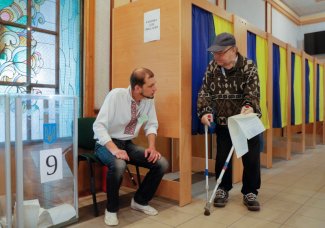Ukraine: Servant of the People wins an outright majority

On 21 July 2019, Ukraine held an early parliamentary election in which Servant of the People, the party led by the country’s president, Volodymyr Zelensky, came out as the winner. The election is decided by proportional representation and, after 93.3% of the votes had been counted, it turns out that the party has won 43.14% of the vote. Other successful parties are: the pro-Russian Opposition Platform “For Life” with 13.05% of the vote, Batkivshchyna led by Yulia Tymoshenko with 8.18%, European Solidarity led by Petro Poroshenko with 8.13%, and the Voice party led by Svyatoslav Vakarchuk with 5.85%. The remaining parties did not cross the 5% electoral threshold. Early results are largely consistent with exit polls. The results of the voting in single-mandate districts indicate that Servant of the People is likely to win 129 seats. Independent candidates have won around 50 seats and the remaining parties are likely to win just a few seats each.
The elections were held according to a mixed electoral system in which half of the chamber’s deputies stipulated in the constitution (225) are elected on nationwide electoral rolls and 199 are elected in single-mandate districts. The missing 26 seats are vacant due to the fact that it was impossible to hold elections in single-mandate districts in Crimea and a portion of the Donbass.
Pursuant to the constitution, the first session of the new Verkhovna Rada is to be held within 30 days from the announcement of the full election results (President Zelensky suggested that this date will be 24 August, Ukraine’s independence day). Within a month from this first meeting, a coalition of one or several parliamentary groups having at least 226 votes will need to be formed. The elections were free and fair and mainly peaceful, with no major disruptions recorded. The turnout was nearly 50%.
Commentary
- The election was an undisputed victory for Servant of the People, a party led by President Zelensky, largely made up of people with no history of political involvement. By winning the election, Zelensky will gain full power in the country (and full responsibility for it), and is free to select candidates for top offices at his discretion. Servant of the People’s result suggests that it will most likely be the first single party to have an outright majority in the Verkhovna Rada since 1991.
- Zelensky’s high personal support and his promise to carry out a thorough reform of the state (which society expects) is the reason behind the success of Servant of the People. The party promised to oust former politicians from power and install new untarnished ones. This is supposed to guarantee the success of the reform, especially as regards combating corruption. However, representatives of Servant of the People failed to present any comprehensive plan for modernisation of the state during the electoral campaign, and only offered vague statements on this issue.
- For the time being, it is not known who will be appointed prime minister and what the new government line-up will be. The words of the president on election night suggest that the candidate for prime minister will be an economist recognised in the West who has no experience in politics. This reduces the chance of Oleksandr Danylyuk, the current secretary of the National Security and Defence Council, former minister of Finance (following the announcement of election results, he stated that he was not interested in assuming the office of prime minister). However, it increases the chance of professionals such as Vladyslav Rashkovan, former deputy head of the National Bank of Ukraine, who at present serves as Ukraine’s representative to the International Monetary Fund.
- As regards other top posts, it seems likely that Dmytro Razumkov, the official leader of Servant of the People, will be appointed speaker of parliament. Vadym Prystaiko appears to be the prospective minister of Foreign Affairs. Mr Prystaiko is an experienced diplomat, the former head of the Mission of Ukraine to NATO, and the current deputy head of the President’s Office responsible for Foreign Affairs.
- The degree to which President Zelensky will be able to control his own newly created party, which is made up of representatives of various groups, remains unknown. The coming months will show the nature of future relations between the president and the Servant of the People parliamentary group, as well as the major groups of influence within it. Due to its size, this parliamentary group will not be homogeneous and it will only be during personnel talks that the influence which oligarch Ihor Kolomoysky wields on the ruling camp will finally be revealed. During recent electoral campaigns, the oligarch showed support for Zelensky and his party. Andriy Bohdan, Kolomoysky’s former lawyer, was appointed head of the President’s Office, which is a post of key importance. So far, Zelensky has distanced himself from the oligarch, however, due to Kolomoysky’s ambitions, a conflict between these two figures seems to be a matter of time. Kolomoysky will probably want to capitalise on his support for Zelensky and to expand his influence in politics and the economy.
- The main opposition parties in the new Verkhovna Rada will be: the pro-Russian Opposition Platform “For Life”, the pro-Western European Solidarity led by former president Petro Poroshenko, and Fatherland of the former Prime Minister Yulia Tymoshenko. All these parties will form parliamentary groups composed of experienced politicians and will have major financial and media resources. The scope of cooperation between the Voice party and Servant of the People remains unknown at present. Ahead of the elections, the Voice party promoted slogans similar to those supported by Servant of the People, including the pledge to remove the old political class, carry out thorough reforms and integrate Ukraine with the EU and NATO. During the election night, Zelensky did not rule out a coalition with the Voice party headed by Vakarchuk. Potential cooperation with Voice and a portion of independent deputies (who have won around 50 seats) will facilitate the plan to build a constitutional majority.
- The new Verkhovna Rada will mainly be composed of political novices and it is likely that the average age of deputies will be the lowest in history. This refers in particular to deputies of Servant of the People and the Voice party. All this means that the election results, alongside Zelensky’s recent election as president, will show whether youth and the lack of political experience will prove effective for laying the ground in Ukraine for thorough reforms, including in the field of combating corruption.
- It cannot be ruled out that the new leadership will intend to hold early local elections. The temptation to gain power in local governments, which have increasing competences and financial resources, was evident in statements by Servant of the People politicians and representatives of the president’s group. However, the legal basis for such a move is unclear. In accordance with the constitution, the date of the next local elections has been set for autumn 2020.




